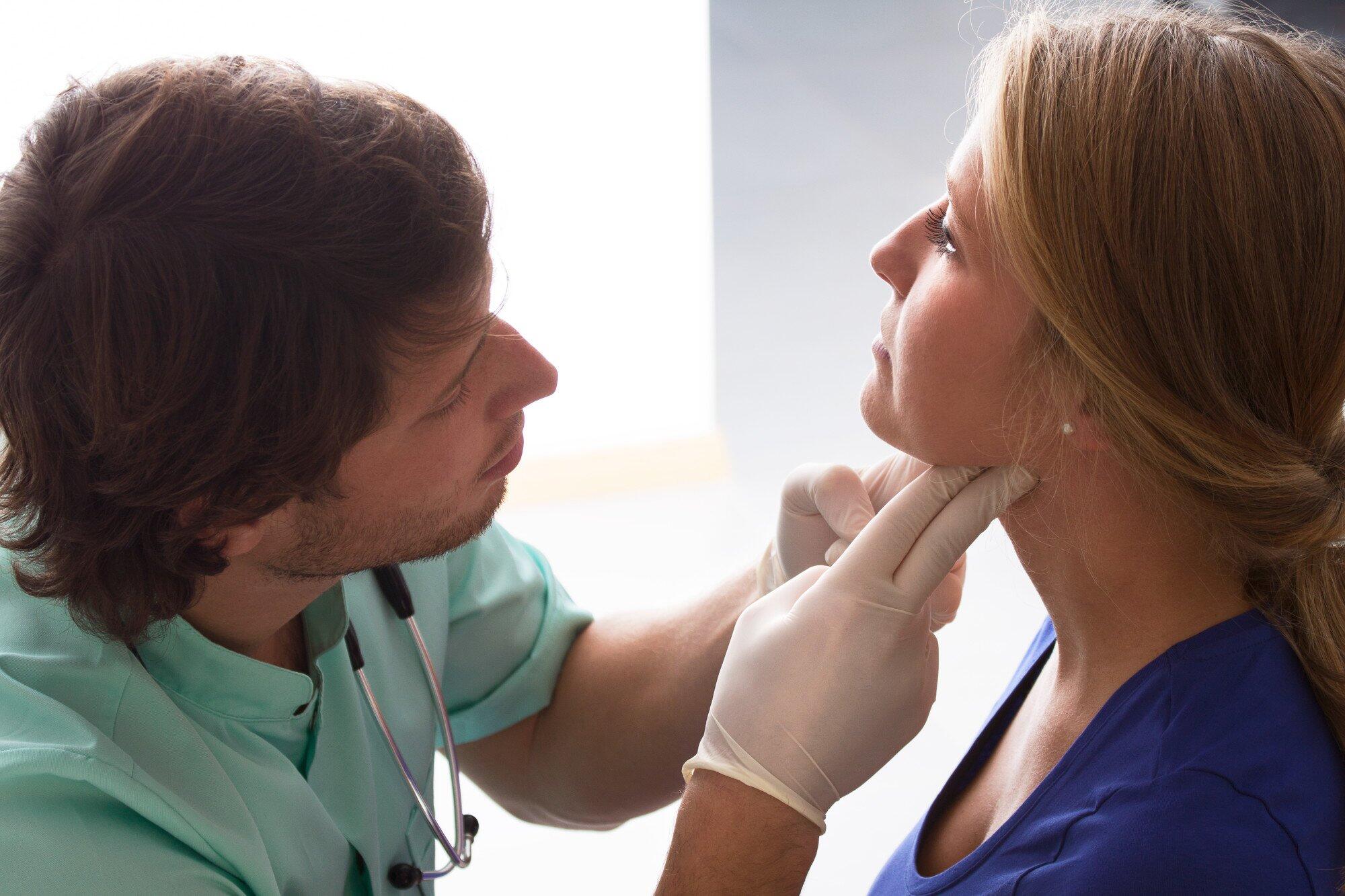Studies show that more than 12% of the U.S. population will experience a thyroid problem at some point in their lives.
This includes one in eight women, whose condition will develop into a thyroid disorder. However, while this issue might be prevalent, it often goes undetected, as around 60% of people don’t know they have thyroid disease until they undergo a screening.
Knowing what to look for can help you spot your symptoms early, so you can seek professional medical help. Today, we’re answering the question, “What are the early warning signs of thyroid problems?” so you can take preventative control of your health today.
What Does the Thyroid Do?
Before we discuss the signs of thyroid issues, let’s take a step back and cover what this gland does, and why it’s so important. The thyroid is a small, butterfly-shaped gland located at the front of your neck. This gland produces two types of thyroid hormones, which help regulate your metabolism, as well as your overall growth and development.
These hormones are called thyroxine (T4) and triiodothyronine (T3). In addition to controlling your metabolism, they also have a role in regulating other functions, including your:
- Digestion
- Heart rate
- Muscles
- Bone maintenance
- Hair growth
- Brain development
What Happens When the Thyroid Malfunctions?
When it’s functioning normally, your thyroid gland should produce the exact, specific number of hormones required to keep your metabolism balanced and running properly. However, in some cases, the thyroid gland can begin to malfunction over time. When this happens, it typically produces too much or too little of the thyroid hormone.
If you have an overactive thyroid, the condition is known as hyperthyroidism. If you have an underactive thyroid, the condition is known as hypothyroidism. Let’s take a look at some of the early warning signs associated with each of these conditions.
There isn’t one definite cause of thyroid disease. Rather, doctors believe this condition can occur as a result of several different factors. Let’s review some of the most common causes.
Iodine Deficiency
Your thyroid gland requires iodine to produce hormones. If your body doesn’t produce enough iodine, it can lead to an enlarged thyroid (goiter) or hypothyroidism.
Radiation Exposure
Individuals who have experienced a significant amount of radiation exposure could be at a higher risk of developing thyroid disease. This includes radiation from medical procedures, as well as environmental sources. The radiation can damage or kill the thyroid, leading to hypothyroidism or, in rare cases, thyroid cancer.
Autoimmune Disease
If someone suffers from an autoimmune disease, such as Hashimoto’s Thyroiditis or Graves’ disease, it can cause their immune system to attack their thyroid gland. This can lead to either hypothyroidism or hyperthyroidism.
Genetics
While a definite link hasn’t been made, researchers believe that certain people may be predisposed to thyroid disease based on their genetics. If you have a family history of hypo- or hyperthyroidism, this could increase your likelihood of developing the same condition.
Surgery
If someone has undergone surgery to remove all or part of their thyroid gland (as a treatment for thyroid cancer), this can lead to hypothyroidism.
Medications
Some medications can interfere with the thyroid’s healthy functioning. Examples include lithium and interferon. When you take these medications, it can affect the amount of thyroid hormone that the gland produces.
Hyperthyroidism: Overactive Thyroid
It isn’t always obvious when you’re suffering from a thyroid disorder. You might mistake the symptoms for other conditions, especially if you experience them infrequently. Hyperthyroidism causes your thyroid gland to work overtime, producing an amount of thyroid hormone that exceeds your body’s normal standards.
If you suspect you might have hyperthyroidism, some of the early signs to look out for include:
- Irregular heartbeat (called arrhythmia)
- Pounding of the heart, or palpitations
- Increased appetite
- Intolerance to heat, excessive sweating
- Frequent, loose bowel movements
- Weight loss
- Warm, clammy skin
- Fine, brittle hair
- Sleep problems
- Muscle weakness and shakiness
- Tremors in the hands and fingers
- Anxiety and nervousness
- General irritability
In the U.S., most cases of hyperthyroidism are linked to a condition called Graves’ disease. This is a type of autoimmune disorder that causes your immune system to attack your thyroid gland. Graves’ disease affects nearly one in every 100 Americans, causing four out of every five cases of hyperthyroidism.
Graves’ Ophthalmopathy
Some individuals with Graves’ disease will develop swelling around their eyes, which gives them a bulged appearance. Common names for this condition include:
- Graves’ eye disease (GED)
- Graves’ ophthalmopathy
- Thyroid eye disease (TED)
In most cases, GED is mild and will normally go away on its own. While it doesn’t usually cause vision loss, it may lead to other vision issues, including double vision. In rare cases, the swelling can press on the individual’s optic nerve, which connects the eye to the brain, leading to vision loss.
In addition to bulging eyes (also called proptosis), individuals with this condition may also experience other symptoms, such as:
- Dry, gritty eyes
- Red or irritated eyes
- Puffy eyelids
- Eye pain or pressure
- Eyes that don’t close all the way
- Eyes that pull back more than usual
- Light sensitivity
- Difficulty moving the eyes when looking around
This condition usually affects both eyes, although individuals may experience more prominent symptoms in one eye than the other. The symptoms usually last one to two years.
Hyperthyroidism in Infants
Hyperthyroidism is rare in infants but can be life-threatening. If it occurs, it’s typically because the mother has current or prior Graves’ disease. Some of the earliest signs that doctors will monitor include:
- Feeding problems
- Failure to thrive
- Vomiting
- Diahrrea
- Irritability
- Hypertension
- Increased heart rate (called tachycardia)
- Bulging eyes (called exophthalmos)
Most children born to mothers with Graves’ disease will present symptoms within the first month. With prompt treatment, they should recover within six months.
Hyperthyroidism in Children and Teenagers
In children and teenagers, the signs of hyperthyroidism can be similar to those that adults experience. Some of the most common ones to watch for include:
- Sleep problems
- Hyperactivity
- Difficulty concentrating
- Decreased school performance
- Emotional unsteadiness
- Intolerance to heat
- Fatigue
- Weight loss
- More frequent bowel movements
- Hand tremors
- Heart palpitations
Adolescents can also develop Graves’ ophthalmopathy, though the symptoms are less prominent than in adults. Some of the most common signs include lagging eyelids, red eyes, or more prominent eyes.
Hypothyroidism: Underactive Thyroid
An under-functioning thyroid is known as hypothyroidism. This causes your thyroid gland to work slower and less effectively than usual.
The symptoms of this condition tend to develop slowly, often over several years. At first, many people don’t even notice the signs, or attribute them to simply getting older. However, as your metabolism continues to slow down, the symptoms will gradually become more obvious.
Some of the early signs that you might be suffering from this condition include:
- Excessive fatigue
- Decreased heart rate (called bradycardia)
- Joint or muscle pain
- Dry skin
- Thinning hair
- Sensitivity to cold
- Weight gain
- Puffiness in the face
- Hoarse voice
- Constipation
- Depression
- Heavy or irregular periods
- Difficulty conceiving
- Memory problems
While most cases of hyperthyroidism are linked to Graves’ disease, most cases of hypothyroidism are linked to Hashimoto’s Thyroiditis. Individuals who have hyperthyroidism use energy more quickly than their body should, while those with hypothyroidism use energy more slowly.
If left untreated, hypothyroidism can lead to other health conditions over time. This includes high cholesterol, as well as heart problems.
Hypothyroidism in Infants
Individuals can develop hypothyroidism at any age. It can even affect infants. If a baby is born without a thyroid gland, or with one that doesn’t work correctly, the symptoms might not be present right away. However, if the condition is left undiagnosed or untreated, the signs will begin to become more prevalent.
Early signs of hypothyroidism in infants include:
- Feeding problems
- Poor weight gain
- Poor growth
- Poor muscle tone
- Constipation
- Dry skin
- Hoarse crying
- Enlarged tongue
- Yellowing of the skin and the whites of the eyes (called jaundice)
In some infants, you may also notice a soft swelling or bulging area near the belly button. This is a condition called umbilical hernia. If these symptoms aren’t addressed soon after birth, hypothyroidism can affect the baby’s mental and physical development.
Hypothyroidism in Children and Teenagers
If hypothyroidism develops during a person’s childhood or teenage years, the symptoms are similar to those that present during adulthood. However, you may notice more of an issue with growth and development during these critical stages.
Some of the early warning signs to look out for include:
- Poor overall growth
- Short stature
- Delayed puberty
- Delayed development of permanent teeth
- Weak mental development
Eye Disease in Hypothyroid Patients
While eye conditions like TED are most commonly associated with hyperthyroidism and Graves’ disease, they can occur in individuals with hypothyroidism or Hashimoto’s Thyroiditis.
Research shows that approximately 6% of patients with Hashimoto’s will develop a correlating eye condition, while 25% of people with Graves’ disease will show symptoms. In one study, researchers examined patients who developed eye symptoms along with Hashimoto’s. They found there were a few common traits these individuals shared that increased their susceptibility to both conditions, including:
- Older age
- Longer duration of Hashimoto’s
- Less likely to have another underlying autoimmune disease
- Higher levels of the thyroid-stimulating antibody TSAb
- More likely to be smokers
As with Graves’ disease, when Hashimoto’s leads to eye issues, they most often include:
Inflammation around the eyes, eye muscles, and nearby tissues
- Dry eyes
- Red eyes
- Bulging eyes
- Double vision
What Are the Early Warning Signs of Thyroid Problems? Shared Symptoms
Some symptoms of thyroid conditions will occur whether someone has hyperthyroidism or hypothyroidism. Knowing these symptoms can help you spot an issue earlier. Some of the most common ones include:
- Changes to your menstrual cycle
- Enlargement of your thyroid gland (called a goiter)
- Sleep problems
- Persistent fatigue
- Unexplained weight gain or weight loss
If you notice any of these issues, schedule an appointment to discuss your condition with your healthcare provider.
Hashimoto’s Thyroiditis vs. Graves’ Disease
Hashimoto’s Thyroiditis and Graves’ disease are both autoimmune disorders that target and affect your thyroid health. However, these two conditions have very different symptoms and results due to two main differences:
- The type of antibodies they attack
- How that attack affects your thyroid
When your immune system is functioning properly, it keeps your body healthy by preventing or fighting off any infections you may develop. It does so by attacking foreign invaders, such as germs and viruses, as soon as they enter your body. After attacking them, it learns them and develops antibodies against them, shielding your body from future invasions.
Sometimes, your immune system can become overstimulated. This can cause it to produce antibodies that attack your own, healthy cells instead of foreign invaders. These antibodies can either destroy those cells or cause them to work at a faster rate.
With Hashimoto’s, the immune system produces antibodies that destroy thyroid cells, which leads to an under-production of thyroid hormone. With Graves’ disease, the antibodies overstimulate thyroid cells, causing them to produce and release too much thyroid hormone.
Women are more likely than men to develop both Graves’ and Hashimto’s disease. While these two conditions are normally diagnosed in mid-adulthood, they can occur at any time. Though their exact cause is unknown, there are a few factors that can increase your risk, including:
- Family history of thyroid problems
- Age
- Environmental factors
Your healthcare provider can determine if you have either of these conditions and recommend appropriate treatment options. Blood tests are commonly used to identify thyroid problems, and hormone therapy can help you achieve a more balanced thyroid function.
Seek Help for Thyroid Problems
If you’re asking, “What are the early warning signs of thyroid problems?”, we recommend visiting a trusted doctor for a diagnosis. Only a medical professional can determine if the symptoms you’re experiencing are related to your thyroid. Many issues, such as weight changes, fatigue, and sleep problems, can also be attributed to other health conditions.
If you do suffer from hyperthyroidism or hypothyroidism, hormone therapy can help regulate your system so you can feel your best. At Evolve, we specialize in personalized hormone and peptide therapies for a variety of patients.
To learn more about our services or schedule an appointment with our team, feel free to contact us online.






